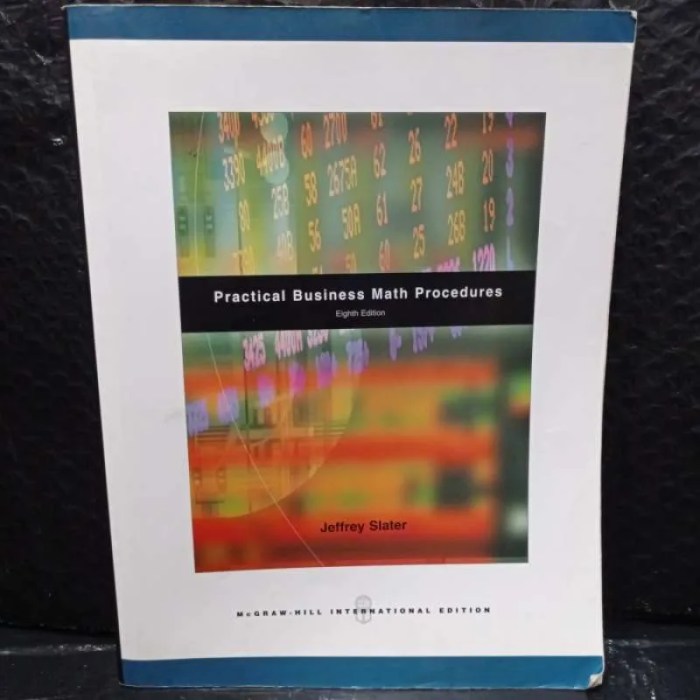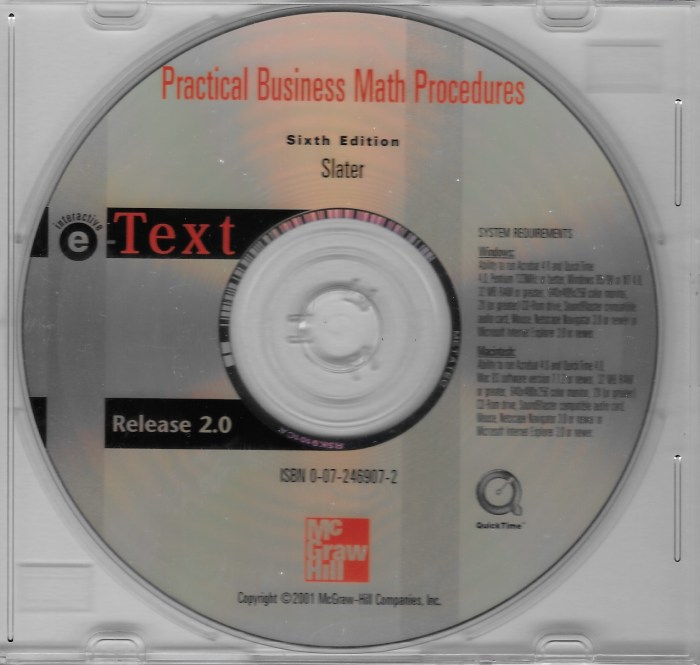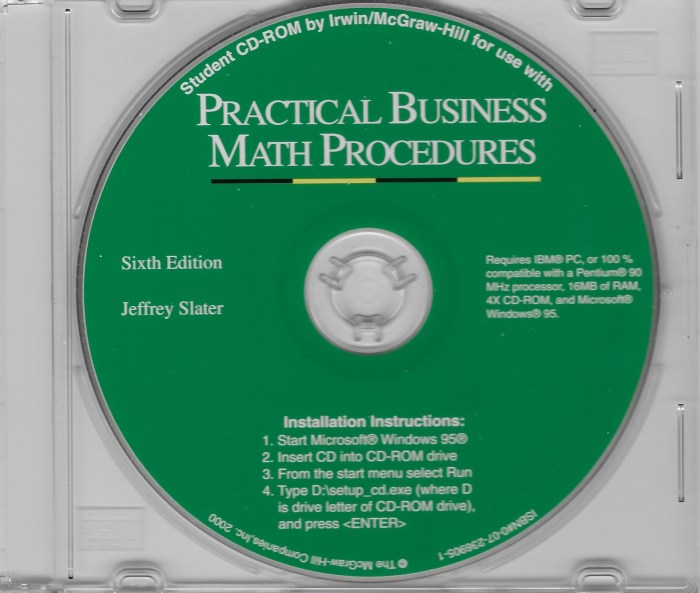Practical Business Math Procedures Epub sets the stage for this enthralling narrative, offering readers a glimpse into a story that is rich in detail and brimming with originality from the outset.
Delving into the intricacies of business mathematics, this comprehensive guide unravels the significance of practical math procedures in real-world business operations, empowering individuals with the essential skills and knowledge to make informed decisions and optimize processes.
1. Business Math Procedures in Practice: Practical Business Math Procedures Epub
Practical business math procedures encompass a diverse array of mathematical techniques and applications that are indispensable in the day-to-day operations of businesses. These procedures provide a systematic approach to solving business-related problems and making informed decisions.
Their significance lies in their ability to streamline processes, optimize resource allocation, and facilitate accurate financial planning. By leveraging business math procedures, businesses can enhance their efficiency, profitability, and overall competitiveness.
Examples of Practical Business Math Procedures
- Calculating discounts and markups to determine optimal pricing strategies
- Analyzing financial statements to assess a company’s financial health
- Using statistics to forecast demand and optimize inventory management
- Applying regression analysis to identify trends and predict future performance
2. Core Concepts of Practical Business Math

Practical business math builds upon the fundamental concepts of arithmetic, algebra, and statistics, adapting them to the specific needs of business operations. These core concepts provide a solid foundation for understanding and applying business math procedures.
Arithmetic
Arithmetic involves the basic operations of addition, subtraction, multiplication, and division. These operations are essential for calculating financial transactions, determining inventory levels, and performing other routine business tasks.
Algebra
Algebra extends arithmetic by introducing variables and equations. This allows businesses to model complex relationships, solve problems involving unknown quantities, and make predictions based on data.
Statistics
Statistics involves the collection, analysis, and interpretation of data. Statistical techniques are used to summarize large datasets, identify trends, and make inferences about populations based on samples.
3. Essential Business Math Skills
Effective decision-making in business requires a strong foundation in essential business math skills. These skills enable individuals to analyze financial data, make informed estimates, and apply mathematical principles to solve business problems.
Essential Business Math Skills
- Basic arithmetic operations
- Algebraic problem-solving
- Statistical analysis
- Financial statement analysis
- Estimation and approximation
These skills are crucial for roles in finance, accounting, operations, and marketing, among others.
4. Applications of Practical Business Math

Practical business math finds applications in various business functions, providing valuable insights and supporting informed decision-making.
Finance
Business math is essential for financial planning, budgeting, and investment analysis. It helps businesses determine optimal capital structures, calculate return on investment, and manage financial risk.
Accounting
Accounting relies heavily on business math for recording transactions, preparing financial statements, and conducting financial audits. Math skills enable accountants to ensure accuracy and compliance with accounting standards.
Marketing
Marketers use business math to analyze market data, forecast demand, and optimize pricing strategies. Mathematical models help them identify target audiences, segment markets, and evaluate marketing campaigns.
Operations
Business math supports operations management by optimizing inventory levels, scheduling production, and managing supply chains. It helps businesses improve efficiency, reduce costs, and meet customer demand effectively.
5. Tools and Technologies for Business Math
Various tools and technologies enhance the efficiency and accuracy of business math calculations.
Spreadsheets
Spreadsheets, such as Microsoft Excel, provide a convenient platform for organizing, manipulating, and analyzing data. They enable users to create formulas, build charts, and perform complex calculations.
Calculators
Calculators, both physical and virtual, offer quick and easy solutions for basic arithmetic operations. They are particularly useful for on-the-go calculations or for verifying results.
Specialized Software
Specialized software, such as accounting software or financial modeling tools, automates complex business math calculations. These tools streamline processes, reduce errors, and provide in-depth insights.
6. Case Studies and Examples

Practical business math procedures are best understood through real-world examples.
Case Study: Inventory Optimization
A manufacturing company implemented a statistical forecasting model to predict demand for its products. By analyzing historical sales data and applying regression analysis, the company optimized its inventory levels, reducing overstocking and stockouts.
Example: Financial Ratio Analysis, Practical business math procedures epub
A financial analyst used business math to calculate key financial ratios for a company. These ratios provided insights into the company’s profitability, liquidity, and solvency, enabling the analyst to make informed investment recommendations.
General Inquiries
What are the core concepts of practical business math?
Practical business math encompasses fundamental concepts such as arithmetic, algebra, and statistics, which are applied to solve real-world business problems.
How can I develop essential business math skills?
Developing essential business math skills requires practice, utilizing resources such as textbooks, online courses, and workshops to enhance your understanding and proficiency.
What are the practical applications of business math?
Business math finds practical applications in various business functions, including finance, accounting, marketing, and operations, enabling businesses to optimize processes, manage resources, and make informed decisions.